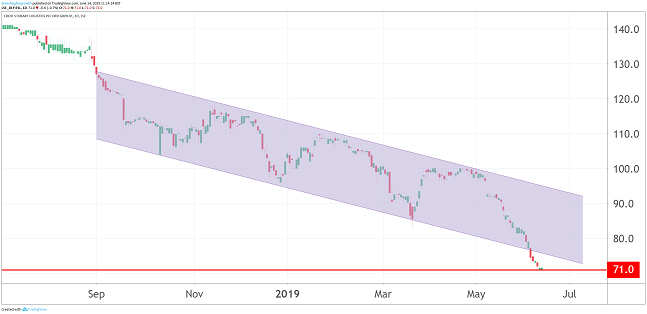Stockwatch: A Woodford bargain now yielding 9%
Hit by the Woodford crisis, this AIM share now trades 30% below recent director share purchase prices.
14th June 2019 10:39
by Edmond Jackson from interactive investor
Hit by the Woodford crisis, this AIM share now trades 30% below recent director share purchase prices.

Has a plunge in Eddie Stobart Logistics (LSE:ESL), the AIM-listed provider of transport, warehousing, rail and freight logistics, over-extended - chiefly as a result of the Woodford funds debacle?
After listing two years ago at 160p, the stock traded broadly flat to the end of 2017, then began a steady decline, reaching 85p by last March. A rebound twice tested 100p, but the downtrend resumed last month, slumping to around 71p currently amid all the furore around the Woodfund funds implosion.
Woodford Asset Management, by far ESL's largest portfolio investor at 25%, triggered fears of a stock overhang, although I would stand back to question if a price/earnings (PE) ratio of 6 and yield close to 9% is a prime example of how UK cyclicals are falling broadly as odds of a hard Brexit increase.
This is the "Eddie Stobart" business most in the public eye, running high-profile iconic lorries on motorways. Its flotation was effectively a re-listing after being taken private in 2014 when parent company Stobart Group (LSE:STOB) received £240 million for a 51% stake. The current market capitalisation is around £250 million.

Source: TradingView Past performance is not a guide to future performance
My sense was that the April 2017 float was quite cannily timed after eight years of UK economic upturn, demand for logistics' services being inherently cyclical unless linked to the growth of online retail and/or food, which does indeed apply to ESL.
Yet a decline in cyclical stocks can be a more pertinent indicator of where the economy is heading than monthly fluctuations in GDP, factory output and the like. So, care must be taken that a low stock price isn't fools' gold. ESL is a sound operation, but should you prioritise economic trends being in its favour?
"Bottom-up", the company has bold claims
At flotation, the chief executive heralded "an appropriate capital structure to take advantage of growth opportunities in the supply chain and logistics market." A year later in June 2018 a further placing at 140p raised £30 million as part consideration for the £52.8 million acquisition of Pallet Network.
At this point, investor confidence remained firm with the placing struck at only a 0.4% discount to market price. However, the stock began falling with the wider market sell-off from last September. Unlike others recovering from early 2019, any rebounds in ESL were modest and soon overcome by renewed downwards pressure.
At the end of March, full-year results to 30 November 2018 showed a circa 14% advance in operating profit, with adjusted pre-tax profit up 32% to £49.2 million on revenue up 35% to £843.1 million.
However, the adjustments were not only for amortisation of acquired intangibles and share costs but also severe weather, start-up costs and netting off gain from lease contracts. Otherwise, reported pre-tax profit was £23.6 million and earnings per share (EPS) 4.4p versus 11.4p adjusted, which is quite some differential.
Strategically, the last financial year was presented as a "milestone of becoming a full end-to-end solution provider," with revenue growth driven by new contract wins new contract "with annualised total revenue of £162 million contract wins both from existing and acquired businesses.
E-commerce related revenue rose 65% to £171 million and retail by 43% to £241.1 million – where ESL works with the majority of UK food retailers – and consumer-related by 26% to £182.1 million. Its manufacturing, industrial and bulk (MIB) segment that was heralded in April 2018 and the biggest revenue contributor rose 16% to £211.1 million for 25% of the total.
| Eddie Stobart Logistics - financial summary | |||||
|---|---|---|---|---|---|
| year ended 30 Nov | 2014 | 2015 | 2016 | 2017 | 2018 |
| Turnover (£ million) | 347 | 497 | 570 | 624 | 843 |
| IFRS3 pre-tax profit (£m) | 6.6 | 6.1 | 11.2 | 9.9 | 23.6 |
| Normalised pre-tax profit (£m) | 6.6 | 8.1 | 24.0 | 37.3 | 49.2 |
| Operating margin (%) | 4.5 | 4.6 | 4.7 | 5.0 | 4.4 |
| IFRS3 earnings/share (p) | 1.3 | 1.3 | 3.3 | 1.2 | 4.4 |
| Normalised earnings/share (p) | 1.3 | 1.5 | 7.9 | 9.8 | 11.4 |
| Earnings per share growth (%) | 14.0 | 127 | 24.1 | 16.3 | |
| Price/earnings multiple (x) | 6.1 | ||||
| Annual average historic P/E (x) | 44.0 | 14.2 | |||
| Cash flow/share (p) | 8.5 | 7.7 | 4.9 | 8.2 | 2.1 |
| Dividend per share (p) | 5.8 | 6.3 | |||
| Dividend yield (%) | 9.0 | ||||
| Covered by earnings (x) | 1.7 | 1.8 | |||
| Net tangible assets per share (p) | -36.3 | -16.5 | -21.3 | ||
| Source: Company REFS |
Margin, cash flow and debt pressures
Operating margins eased from 7.8% to 6.6% due to "temporary costs of re-optimising networks as a result of major contract wins," and net cash from operations fell from £18.9 million generated to £3.3 million absorbed, partly as a £7.1 million net interest charge wiped out cash generation post-adjustments.
Short-term debt has jumped 362% to £35.9 million and longer-term debt by 13% to £129 million, versus year-end cash of £5.2 million, hence net debt of £159.7 million. Working capital investment - that's partly brought this about - is expected to normalise this year.
So net financial gearing 68% of net assets, albeit supported 132% by £312.2 million goodwill/intangibles. There's also £8.7 million deferred consideration for acquisitions being paid over 24 months from June 2018, £2.7 million having been recognised in the last accounts to end-November.
ESL's de-rating could thus part-reflect investor wariness that management has geared up late in the economic cycle, with mild signs of acquisitions' strain apparent. But, most crucially, the company may now lack financial flexibility to invest at anywhere near recent pace.
Another share issue would be especially dilutive at or below current market price. So, for the foreseeable future, ESL's financial statements look likely to reflect standalone performance than recent boost from acquisitions.
In which respect the chairman's outlook statement was guarded, and this was nearly three months ago:
"Whilst we remain mindful of the current political and economic uncertainty, we are confident our unique operating model provides us with flexibility to respond rapidly to changing market conditions."
He cites "a consulting-led, pay-as-you-go network model...enabling us to leverage value from the entire supply chain." Time will tell how durable for performance, the jargon proves. A further reassurance of sorts is sub-2% of group revenue being generated from crossing the English Channel (i.e risk of hard Brexit disruptions).
Director share buying
On 8 April, the chairman bought 12,500 shares at 97.5p to own 50,000 overall, and on 12 April a non-executive added 10,000 at 99p to own 30,000 in total. Such prices represent a PE multiple of 8.7x adjusted historic EPS, albeit 22.5x statutory, and a yield of 6.4%. So, so if the payout can be reasonably sustained then, with the stock at around 71p, its yield tests 9%.
Still, it depends on the £22.5 million cost being supported by an improved cashflow profile, assuming acquisitions/investment slow. The results statement didn't provide any guidance as to development objectives or dividend policy, except to say a 2019 target is to reduce gearing towards a long-term average of 2.0x EBITDA (adjusted cash profit).
So, I'm cautious as to medium-term prospects: if ESL's financial statements go ex-growth then attention will shift to what kind of payout the group can prudently support.
It's possible the stock's recent decline adequately discounts this risk, and for sure ESL is a good business operation now digitally-attuned. I sense it is best to wait, given the risk that a hard Brexit will knock UK cyclical stocks (and potentially underlying performance) irrespective of market technical risk regarding the Woodford stake. Buy on weakness.
Edmond Jackson is a freelance contributor and not a direct employee of interactive investor.
These articles are provided for information purposes only. Occasionally, an opinion about whether to buy or sell a specific investment may be provided by third parties. The content is not intended to be a personal recommendation to buy or sell any financial instrument or product, or to adopt any investment strategy as it is not provided based on an assessment of your investing knowledge and experience, your financial situation or your investment objectives. The value of your investments, and the income derived from them, may go down as well as up. You may not get back all the money that you invest. The investments referred to in this article may not be suitable for all investors, and if in doubt, an investor should seek advice from a qualified investment adviser.
Full performance can be found on the company or index summary page on the interactive investor website. Simply click on the company's or index name highlighted in the article.
Disclosure
We use a combination of fundamental and technical analysis in forming our view as to the valuation and prospects of an investment. Where relevant we have set out those particular matters we think are important in the above article, but further detail can be found here.
Please note that our article on this investment should not be considered to be a regular publication.
Details of all recommendations issued by ii during the previous 12-month period can be found here.
ii adheres to a strict code of conduct. Contributors may hold shares or have other interests in companies included in these portfolios, which could create a conflict of interests. Contributors intending to write about any financial instruments in which they have an interest are required to disclose such interest to ii and in the article itself. ii will at all times consider whether such interest impairs the objectivity of the recommendation.
In addition, individuals involved in the production of investment articles are subject to a personal account dealing restriction, which prevents them from placing a transaction in the specified instrument(s) for a period before and for five working days after such publication. This is to avoid personal interests conflicting with the interests of the recipients of those investment articles.